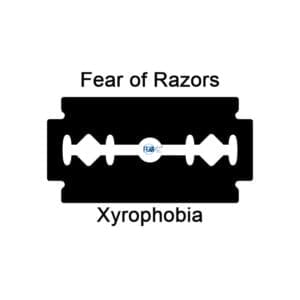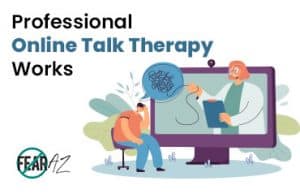Share This Article
Fear of Razors – A Deep Cut
Have you been avoiding shaving because of your fear of razors? Do you avoid going into bathrooms for fear of finding someone shaving? Does simply looking at a razor fill you with dread?
If so, you may have xyrophobia or fear of razors.
Unfortunately, it’s unlikely you can avoid razors in your everyday life, which puts you in a bind. From hyperventilating at the sight of razors to having a panic attack listening to someone talk about a shaving accident, hiding this fear isn’t easy.
Thankfully, coping and overcoming it is.
Whether you’re trying to figure out your symptoms or finding ways to overcome them, you’ve come to the right place. Keep reading to learn all you need to know about xyrophobia!

What Causes the Fear of Razors?
Your unique anxiety around razors must have got you wondering, why am I so scared of razors?
Like all phobias, the fear of razors is an irrational fear. This also makes xyrophobia causes challenging to narrow down. But they’re often rooted in a person’s environment or genetics.
So, if someone has a family history of mental illness or anxiety disorder, they’re likely to develop symptoms of xyrophobia. And this likelihood will increase if the person comes in contact with a trigger.
A person may also develop a fear of razors due to environmental factors, such as growing up watching a parent or relative struggle with a similar or different phobia or going through a traumatic experience involving razors or sharp-edged objects.
The risk of developing a phobia may also increase with an imbalance in the neurotransmitter levels of the brain.
Regardless of the cause, the phobia creates a strong subconscious link in your mind between razors and negative emotions, resulting in a negative panic response.
So, although figuring out the exact cause of the fear isn’t easy, there are ways to treat the phobia and eventually overcome it.
But first, let’s work from the start: What is xyrophobia? Read on for more.
Everything You Need to Know about Xyrophobia
Xyrophobia is a fear-type phobia that results in a fear of razors. It is categorized as an anxiety disorder in the DSM-V, but xyrophobia isn’t as irrational as some on the list of phobias.
It creates a fear of shaving and shaving products in general. Not only does the person fear razors, but they also develop anxiety simply thinking about razors.
Left unchecked, the fear quickly translates into avoidance behavior, where the person avoids going to places they may encounter a razor. So, it may cause a person with xyrophobia to struggle to cope with going into the bathroom in fear of finding a razor there.
Symptoms of Xyrophobia
Xyrophobia symptoms can occur when a person comes in contact with razors or thinks about them. The makeup of symptoms can differ for every person and is best diagnosed by a licensed professional.
To be diagnosed with a fear of shaving, a person must experience at least three to five of the symptoms given below. And these symptoms should last for at least six months or longer.
Physical Symptoms
- Dry mouth
- Shakiness or tremors
- Excessive sweating
- Muscle tension
- Hyperventilation
- Increased heart rate
- Nausea
- Feelings of dizziness or fainting
- Hot/cold flashes
- Migraine
Psychological Symptoms
- Anxiety when thinking about razors
- Butterflies in the stomach
- Panic attacks
- Anxiety when in proximity to razors
- Inability to cope with anxiety
- Avoiding razors
- Fear of impending doom
- Depression
In severe cases, a xyrophobe may also require hospitalization if they come in close contact with razors, are unable to deal with their fear, or let it fester for too long.
How Do You Deal with Xyrophobia?
Acknowledging your phobia is half the battle won. And while there is no one solution that guarantees a cure, incorporating self-help practices and seeking professional help should be your next steps.
Self-Help Solutions for the Fear of Razors
Self-help strategies can improve the effectiveness of your xyrophobia treatment. They can also help strengthen your mind and body so you’re better able to cope with your triggers.
Some of the best self-help strategies you can try are:
Regular Exercise
Regular exercise can help reduce your stress while also filling your bloodstream with feel-good chemicals.
Eating a Healthy Diet
Eating nutritious, balanced meals helps keep your body functioning at its optimal, which can be helpful during the treatment.
Practicing Mindfulness
Regularly practicing mindfulness techniques can help you release some of your stress while also allowing you to relax.
Reducing the Use of Stimulants
Reduce your intake of stimulants like coffee and alcohol, which are known to increase anxiety symptoms.
Professional Help for Xyrophobia
When you’re ready to seek professional help, here’s what you might expect your therapist to prescribe. While these are not the only treatments for anxiety disorders, they’re the most popular and effective ones.
Cognitive Behavioral Therapy (CBT)
CBT is the most popular therapy for treating anxiety disorders such as phobias. It helps identify your triggers and negative thought patterns and guides you to replace the irrational thoughts around the fear with positive ones.
Dialectical Behavioral Therapy (DBT)
DBT involves working on the person’s fear responses and changing them into positive responses that help them cope better with the fear.
Exposure Therapy
Exposure therapy is a form of treatment that involves gradually exposing the patient to their phobia triggers through thoughts, stimuli, and eventually the object of fear itself.
Mindfulness-Based Stress Reduction (MBSR)
MBSR therapy involves managing anxiety and stress through lectures, group sessions, discussions, meditation, yoga, and more.
Learning to Cope with Xyrophobia
The journey toward a cure for a phobia is a long one. So, learning how to cope with the condition is necessary if you want to live a normal life.
Practicing self-help should put you on a path to improved mental health. It is also helpful to rely on close family and friends for support.
When you have a healthy support group to back you up on difficult days, living with the fear of razors won’t feel as debilitating. It’ll also make your treatment more effective.
The Takeaway
As long as you’re not one to shy away from overcoming your fear of shaving/razors, there are plenty of solutions to help you get over your xyrophobia.
With the right attitude and consistent actions, a cure is so much closer. And so is the day you can put all thoughts of razors to rest.




